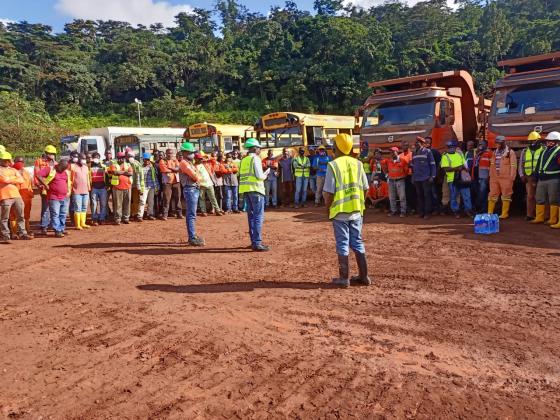Liberia: AML Workers Threaten Strike Action

AML workers at the mining site in Yekepa
..... Over unfair labor practices, low wages
The workers of ArcelorMittal Liberia (AML) has threatened the world's second largest steel producer with strike action over unfair labor practices beginning December 3.
The workers’ action was communicated through the United Workers Union of Liberia, an umbrella union that seeks the interest of nearly all mining concession workers across the country. According to the union, the company management has, for the last eight months, failed to adhere to their plight despite the signing of a collective bargaining agreement.
“The United Workers Union of Liberia is constrained to bring to your attention that we have exhausted all efforts over the past months to bring AML to reaching an agreement on Annexure ‘E’ 5.1 and 5.2 of the Collective Bargaining Agreement,” the union said in a written communication to the Minister of Labor, informing him of their pending action.
They explained in the letter that annexure E of the CBA addresses issues of equal work for equal salary and equal value, something the union claims has not been honored by the company and, as such, the workers are going to lay down all tools until their demands are met.
“We want to guide ourselves under section 41.1 and 41.3 of the Decent Work Bill Act of 2015 to request the Ministry of Labor [for workers] to strike at the AML on December 3,” the union added.
The announcement of pending strike action at AML took place the same day of President George Weah’s meeting in Doha, Qatar, with Lakshmi Mittal, Executive Chairman of ArcelorMittal. The two held discussions centered around resolving all outstanding issues relating to the Revised Mineral Development Agreement (“MDA”).
The MDA has faced serious setbacks after the House of Representatives in 2021, in a rare moment of bipartisanship, rejected several original clauses in the ArcelorMittal US$800 million amended agreement.
The House then claimed that the amendment, as written by ArcelorMittal Liberia, is highly disadvantageous to a poor and struggling country like Liberia; saying that it gives the steel giant monopolistic control over Liberia’s infrastructure assets, particularly the rail and port, while limiting the state’s ability to grant other users’ access to such sovereign assets.
And in time past, AML has been accused of unfair labor practice, something that has seen the company workers going on strike frequently to have their demands addressed. Just last year, the company was found guilty by the Ministry of Labour of unfair labor practice and therefore ordered the payment of US$308,000 as compensation to former employees who were sacked unfairly.
The Union, however, in a letter to AML Chief Executive, Jozephus Coenen, claimed that since the signing of the Collective Bargaining Agreement, “two key issues, which should have been negotiated within 90 days between the two parties, had not been concluded.”
They named the two key issues as, job grade restructuring and salary increment, which is intended to end the “huge disparities in job grading and salary at the AML.”
According to the Union, AML suffers from huge disparities in job grading and salaries, and it is out of grave concern that they wish to have these matters addressed.
“It is disheartening to note that since the union requested a meeting with the management on October 27, said meeting has not been held, something we feel… is not a priority to the management,” the Union noted.
“The Workers are the generator of AML’s income and they must be fairly and equally retreated at the workplaces because there should be equal pay for equal work and for equal value. The Workers are tired of this unfair labor practice and this will cause them to make legitimate decisions.”
Meanwhile, AML Communication Manager, Winston Daryou, has said that the company is still in discussion with the workers union “with some considerable issues already met,” but did not specify.
“AML and its union are still continuing talks to address the few outstanding issues from the recent CBA,” he said. “Discussion on those outstanding issues have spanned for a couple of months with considerable actions already implemented by management.”
